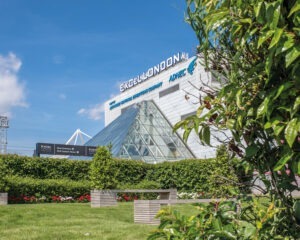Breaking down the company’s recent sustainability strategy
International exhibition and convention center ExCel London is a carbon-neutral venue and an advocate for the path towards green meetings. At over 100,000 sq. ft.—soon to debut over 25,000 more—and hosting around 400 events and 4 million visitors per year, it is the largest event venue in London. Recently, the company debuted a comprehensive sustainability strategy.
ExCel’s Sustainability
 ExCel has established a reputation as an organization committed to doing better for the planet. It is a Planet Mark-certified business and a signatory of the Net Zero Carbon Events Pledge—which means it has committed to accomplishing a 50% emissions reduction by 2030 and net zero by 2050. In 2022, the center was the first U.K. venue of its kind to achieve carbon neutrality in the internationally recognized PAS 2060 standard.
ExCel has established a reputation as an organization committed to doing better for the planet. It is a Planet Mark-certified business and a signatory of the Net Zero Carbon Events Pledge—which means it has committed to accomplishing a 50% emissions reduction by 2030 and net zero by 2050. In 2022, the center was the first U.K. venue of its kind to achieve carbon neutrality in the internationally recognized PAS 2060 standard.
ExCel’s long history of sustainability initiatives includes its zero-waste-to-landfill policy, in which all waste is either recycled or sent to an energy recovery facility to be converted to renewable energy. It also is home to the U.K.’s largest wormery. There, over 300,000 worms convert leftover food waste into compost that is used in the center’s green spaces.
In August 2023, ExCel released its pioneering Sustainability Strategy as part of its parent company ADNEC Group’s wider ESG (environmental, social and governance) ambitions and own sustainability strategy. While developing its strategy, ExCel ensured it was in line with ADNEC Group’s, while tailoring its goals to consider the venue’s unique set of material topics and stakeholder needs.
Read More: Seeking Sustainable Venues
Creating the ExCel Sustainability Strategy
To learn which sustainability issues were most pressing for the company, ExCel held a materiality assessment at the end of 2022. Over 600 stakeholder representatives attended, including event organizers, exhibitors, employees, visitors, event industry partners and the local community.
After the company compiled a list of key material issues based on an examination of stakeholder engagement, internal documents and sustainability frameworks (like the United Nations Sustainable Development Goals, or UN SDGs), representatives at the materiality assessment scored each issue based on its positive or negative effect and scale of impact. Central issues included health and safety, energy and waste management, sustainable procurement, venue accessibility, climate action, compliance and ethics, and a platform for good.
ExCel’s internal working groups reviewed and validated these issues, ranked by their total score. The company’s leadership team approved a final ranked list of material issues from which the company would build its sustainability strategy.
For each of these issues, the ExCel team assessed the related KPIs (key performance indicators), the risk of not addressing, key actions for short- (by 2025), medium- (by 2027) and long-term (by 2030), as well as assessment of what the company already does, the opportunity brought by improving and the departments primarily responsible for each issue.
This assessment led the team to consolidate the identified issues into five pillars, each of which addresses a number of the material topics, outlines clear action plans towards achieving them in the short-, medium- and long-term and KPIs to measure progress towards achievement.
Read More: Sustainability as a Practice
The Five Pillars
1. Sustainable Venue and Events

The overarching goal of this pillar is to prioritize action that reduces scopes one, two and three greenhouse gas emissions (GHGs) and an evolution towards net-zero GHGs. To do so, ExCel will work towards reducing its current operational emissions, champion low-carbon events and invest in sustainable technologies that allow venues and planners to achieve those objectives.
ExCel will measure its progress towards this goal with the KPIs of a 75% recycling rate by 2025, a 50% carbon emissions reduction by 2030 and net-zero by 2050. The company has already made significant steps towards this goal with its existing landfill diversion rate of 100%.
The material topics this pillar addresses are energy, waste and water management, climate action, air quality and biodiversity.
2. People, Culture and Safety
This pillar ensures that all employees and visitors at ExCel will encounter a positive culture that makes them feel welcome and safe, and all employees will enjoy a positive experience that inspires them to develop professionally and individually; ExCel hopes this culture will also attract new talent.
The company will invest in training to upskill employees and provide personal career development. It will also ensure that people of all backgrounds are encouraged to join the team or visit the venue and face no fears of discrimination or inaccessibility.
To see material results proving these goals have been accomplished, the company aims to see year-on-year increases in employee satisfaction levels and survey respondents and an increased average tenure of employees. ExCel aims to achieve an accessibility certification by 2025. The company will also provide two apprenticeship programs, with priority for candidates from Newham or the surrounding community.
The material topics this pillar covers include health and safety, an accessible venue, workplace culture, attracting and retaining talent, and addressing the cost of living.
Read More: The SEPC: Learn to be a Green Planner
3. Our Community and Platform for Change
Pillar three sets a standard for ExCel to connect with the local community and maintain a reputation as a platform for positive impact. It hopes that local organizations, schools and charities take pride in using the venue for events and exhibitions. The company will continuously engage with local stakeholders to identify collaboration opportunities, support development that contributes to social value and ensure that clients and organizers using the venue engage with the local community.
Measurable effects will be year-on-year increases in charitable contributions, the venue’s increased financial and social value contribution to the London economy and increased promotion and support of legacy projects for events. ExCel plans to hold a minimum of 12 meetings with local stakeholders annually to support crime reduction.
This pillar covers the material topics of biodiversity as seen in pillar one, addressing the cost of living as seen in pillar two, creating a platform for good and community impact.
4. Clients, Partners and Supply Chain
Because ExCel’s business value is centered on in-person events, it aims to act responsibly by accounting for the impact of these in-person events through its value chain. The company will look to its procurement and will encourage and support clients in making sustainable choices. This effort aims to influence best practices throughout the company’s supply chain and in the wider industry.
ExCel plans to maintain London Living Wage accreditation, a U.K. accreditation from the Living Wage Foundation for employers committed to paying employees a living wage for their area and adjusting it to keep up with shifts in what qualifies as a living wage for the area. The company also hopes to see a year-on-year increase in sustainable procurement of materials and products and in sustainable media products and food and beverage menus offered to clients. It will comply with ESG supply chain criteria and work to continuously reduce its scope three emissions.
Material topics include waste management and climate action as seen in pillar one, addressing the cost of living as seen in pillars two and three, sustainable procurement and food and beverage.
5. Governance and Ethics
Under this pillar, ExCel London aims to uphold the highest standards of ethics and corporate governance by encouraging decision-making that aligns with the interests of all stakeholders. Its policies and practices must operate in line with its values. Transparent rules and goals, in line with sustainability and ethics, mitigate risk and support business goals.
The company intends to always conduct business in an ethical manner that matches its values. It will prevent and plan for potential threats to its continuity and continuously provide high-quality service to customers. To achieve this, the company aims for all employees to complete cybersecurity and compliance training and ethics training. The company will hold four town hall meetings and six ESG focus groups each year and hopes to see a year-on-year improvement in sustainability data quality and a continuous achievement of ADNEC Group’s EBITDA (earnings before interest, taxes, depreciation and amortization) and revenue targets.
This pillar addresses the material topics of workplace culture as seen in pillar two, compliance and ethics, and human rights.
Implementing the ExCel Sustainability Strategy

A governance framework within the company will support and coordinate all activities which take place as a result of the sustainability strategy.
The strategy includes a clear internal hierarchy and reporting lines for all involved parties working to achieve the listed objectives. This governance framework will conduct performance monitoring to ensure timely achievement of all the goals and objectives. It will provide reports to both internal and external audiences, including ADNEC Group and stakeholders.
In the full sustainability strategy, ExCel also examined its contribution in the global effort towards sustainability. The strategy is aligned with ADNEC Group’s sustainability strategy. It is also aligned with eight of the 17 UN SDGs, and the company’s net-zero strategy aligns with the U.K.’s net-zero strategy, Build Back Greener, a ten-point plan for a green industrial revolution that keeps the U.K. on track for net-zero emissions by 2050.
In Action
ExCel London feels well-positioned to achieve the strategy’s goals. It made an effort for its action plans to be achievable, yet ambitious. The governance structure provides strong leadership to ensure that the strategy is embedded in all the company’s actions from now on, and will ensure transparent reporting that holds the company to a high standard.
The company plans to repeat the materiality assessment that kicked off the creation of this sustainability strategy every three years to update its targets in a manner consistent with the latest accomplishments and areas of need, as well as to align the business with what is most important to stakeholders.
“By shaping the future of our events into one that is net zero, resource efficient and equitable, we aim to be a sustainability leader within our industry,” ExCel CEO Jeremy Rees says. “I’m proud to say that our sustainability strategy is not only embedded in our business planning process but is fully supported by ADNEC Group, the ExCel Board and the wider ExCel team.”
ExCel has certainly set a standard for companies all over the globe that are seeking ways to be more sustainable. As more venues follow in their footsteps, the world of events will become ever more sustainable and serve as a pioneering industry for the rest of the world in this mission.
Read More: Re-incorporating Sustainability Into the Future of Meetings




